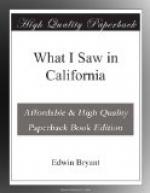The rain fell heavily on the morning of the 3rd, but continuing our journey we crossed the St. Ynes Mountain, and, passing the mission by that name, reached the rancho of Mr. Faxon after dark, where we halted for the night. Around the mission of St. Ynes I noticed, as we passed, immense quantities of cattle bones thickly strewn in all directions. Acres of ground were white with these remains of the immense herds belonging to this mission in the days of its prosperity, slaughtered for their hides and tallow. We met two or three elegantly dressed Californians to-day, who accosted us with much civility and apparent friendliness.
Mr. Faxon is an Englishman by birth, and has resided in California about thirty years. He is married to a Californian lady, and has a family of interesting and beautiful children. A large portion of the land belonging to his rancho is admirably adapted to agriculture, and he raises crops of corn and vegetables as well as wheat without irrigation. He informed me that the yield of wheat on his rancho was fully seventy bushels to the acre. Mr. F. showed me specimens of lead ore from which he moulds his bullets, taken from an inexhaustible mine in the Tular Valley, some fifty miles distant from this. It is certainly the richest ore that I have ever seen, appearing almost like the pure metal. He also showed me a caustic alkali, produced by burning a plant or shrub which grows in great abundance in the Tular Valley. This substance is used by him in the manufacture of soap.
About noon on the 4th, we halted at the rancho of Captain Dana, where we procured fresh horses, leaving our wretchedly lean and tired animals, and, proceeding on, stopped for the night at the rancho of Mr. Branch, an intelligent American, originally from the state of New York, who has been settled in the country a number of years. His rancho is situated on what is called the arroyo grande, a small stream which empties into the Pacific some two or three miles from the house. The house is new, and constructed after American models of farm-houses, with neat and comfortable apartments, chimneys and fireplaces. The arable lands here are finely adapted to the culture of maize, wheat, and potatoes.
Our horses straying, it was twelve o’clock on the 5th before we found them. The rain had fallen steadily and heavily all night, and during the forenoon, and was pouring down when we started. We passed through the mission of San Luis Obispo just before sunset, intending to halt at a rancho about three miles distant in a canada. But, the storm increasing in strength, it became suddenly so dark in the mountain-gorge, that we could not distinguish the trail, and, after wandering about some time, vainly attempting to find the house, we were compelled to bivouac, wet to our skins, without fire or shelter, and the rain pouring down in torrents.




